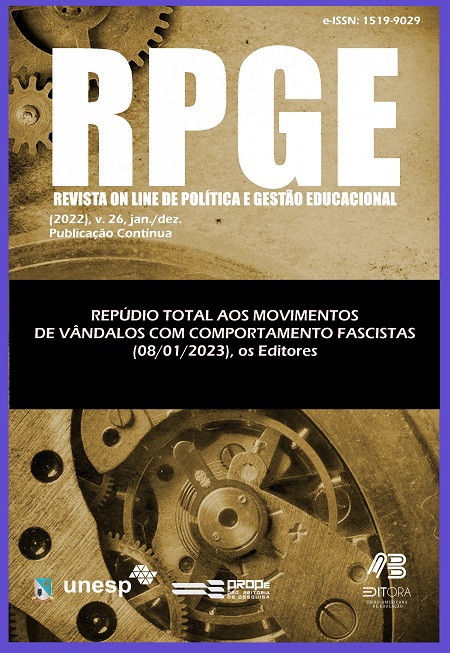Formação da comunicação digital na atividade organizacional e pedagógica da universidade
DOI:
https://doi.org/10.22633/rpge.v26i00.17330Palavras-chave:
Comunicação digital, Ambiente digital universitário, Recursos educacionais, DigitalizaçãoResumo
Os autores realizaram um estudo sociológico com análise mais aprofundada das oportunidades e ameaças associadas à introdução do ambiente digital no. Os critérios propostos para a digitalização da modelagem estão focados em ativar o potencial inovador e criativo dos alunos, atividade científica e de projeto do corpo docente, bem como na melhoria do nível profissional de formação de pessoal e funcionários da universidade, inclusive contribuindo para o desenvolvimento pessoal e melhorando a eficiência do trabalho. Esses critérios permitem que a marca universitária assuma uma posição estável em um ambiente competitivo e amplie o público-alvo. A introdução de um ambiente digital de informação e comunicação torna estável o desenvolvimento econômico da universidade e, como resultado, amplia as opções de parcerias, projetos científicos e educacionais de grande envergadura que dão o direito de entrar no espaço sociocultural moderno de o país e o mundo
Downloads
Referências
DUDIN, M. N. et al. Situation and problems of digitation of university management in Russia and in three Latin-American countries (Argentina, Chile, and Brazil). Formacion Universitaria, v. 13, n. 6, p. 61-76, 2020. Available in: https://www.elibrary.ru/item.asp?id=45030663. Access in: 20 Jan. 2022.
EVSIKOVA, T. et al. Development of information culture as a key attribute of a modern specialist in the process of training future translators. Revista EntreLinguas, Araraquara, v. 8, n. esp. 1, Mar. 2022. Available in: https://periodicos.fclar.unesp.br/entrelinguas/article/view/16938. Access in: 03 Feb. 2022.
GONCHAROVA, M.; GONCHAROVA, N. Reloading the system of higher education in the conditions of the formation of the digital educational environment in the Russian Federation. Psychological and pedagogical journal Gaudeamus, v. 18, n. 4, 42, p. 7-14, 2019.
HERNÁNDEZ DE VELAZCO, J. J. et al. Relevance and social responsibility of sustainable university organizations: analysis from the perspective of endogenous capacities. Entrepreneurship and Sustainability Issues, v. 7, n. 4, p. 2967-2977, 2020. Available in: https://jssidoi.org/jesi/article/565. Access in: 20 May 2022.
KLIMOV, A. et al. About the Digital Ecosystem of The Modern University. Modern Information Technologies and It Education, v. 15, n. 4, p. 815-824, 2019.
KUZ'MIN, P. Semiotic method for knowing reality: limits of applicability. Bulletin of the Russian university of friendship of peoples. Series: theory of language. Semiotics. Semantics RUDN, v. 10, n. 3, p. 610-621, 2019.
RETS, N. et al. Effectiveness of foreign language teaching techniques: provision of feedback as a way to correct writing mistakes. Revista EntreLinguas, Araraquara, v. 8, n. esp. 1, Mar. 2022. Available in: https://periodicos.fclar.unesp.br/entrelinguas/article/view/16934. Access in: 18 Apr. 2022.
SANCHEZ, J. J.; ALEMAN, E. Teachers’ opinion survey on the use of ICT tools to support attendance-based teaching. Computers & Education, v. 56, n. 3, p. 911-915, Apr. 2011. Available in: https://www.sciencedirect.com/science/article/abs/pii/S036013151000326X. Access in: 02 May 2022.
SLEPOV, V. A. et al. Methodological Approaches to Financing Higher Education Institutions in the Context of Digitalizing the Russian Higher Education. Revista Tempos e Espaços em Educação, v. 14, n. 33, 2021. Available in: https://seer.ufs.br/index.php/revtee/article/view/15928. Access in: 23 Feb. 2022.
USACHEVA, O.; CHERNYAKOV, M. Assessment of the readiness of higher educational institutions for the transition to a digital educational environment. Vysshee obrazovanie v Rossii, v. 29, n. 5, p. 53-62, 2020. Available in: https://vovr.elpub.ru/jour/article/view/2247?locale=en_US. Access in: 13 Oct. 2021.
VAN HEERDEN, D.; GOOSEN, L. Information and Communication Technologies to Change Education. Conference: Proceedings of the South Africa International Conference on Education, 2020. Available in: https://www.researchgate.net/publication/346717946_Information_and_Communication_Technologies_to_Change_Education. Access in: 17 Feb. 2022.
VANYUSHKINA, V. University brand in digital educational environment. Bulletin of the RSEU, n. 4, p. 26-33, 2019.
VDOVINA, M. et al. The impact of digitalization on social and pedagogical work development. Nuances: Estudos sobre Educação, Presidente Prudente, v. 32, e021021, Jan./Dez. 2021. Available in: https://revista.fct.unesp.br/index.php/Nuances/article/view/9209/pdf_1. Access in: 08 Feb. 2022.
ZHAROV, A. N. et al. Impact of the Pandemic on the Learning Process of Foreign Students Studying in Russia and Prospects for Educational Migration. European Journal of Contemporary Education, v. 11, n. 2, p. 582-591, 2022.
Downloads
Publicado
Como Citar
Edição
Seção
Licença
Copyright (c) 2022 Revista on line de Política e Gestão Educacional

Este trabalho está licenciado sob uma licença Creative Commons Attribution-NonCommercial-ShareAlike 4.0 International License.
Manuscritos aceitos e publicados são de propriedade da Revista on line de Política e Gestão Educacional. É vedada a submissão integral ou parcial do manuscrito a qualquer outro periódico. A responsabilidade do conteúdo dos artigos é exclusiva dos autores. É vedada a tradução para outro idioma sem a autorização escrita do Editor ouvida a Comissão Editorial Científica.











